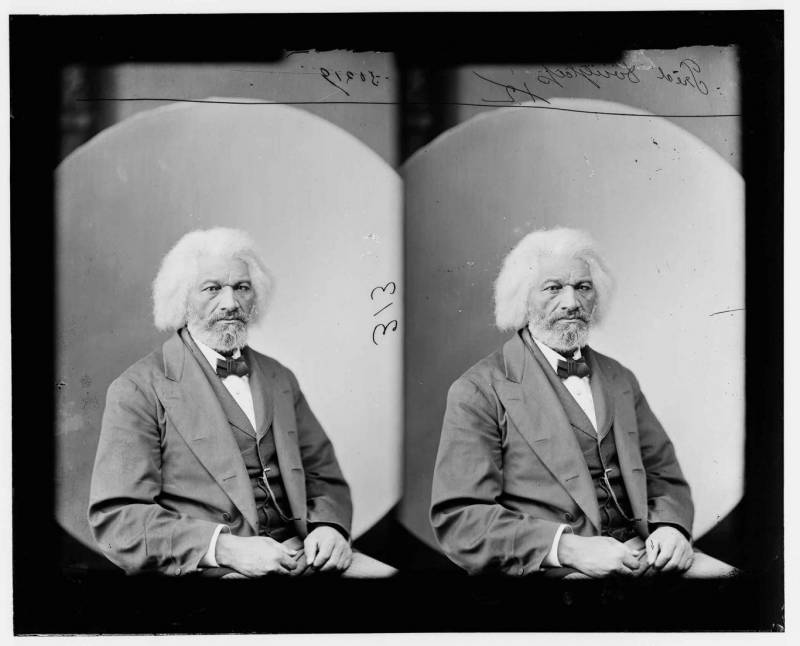In 2026, American democracy is supposed to celebrate its quarter-millennium birthday, but the GOP is raining on the parade.
In 1852, Frederick Douglass unleashed rhetorical fireworks when he asked, “What, to the slave, is the Fourth of July?” This stereoscopic portrait of Douglass was taken ca. 1877.LIBRARY OF CONGRESS, MANUSCRIPT DIVISION, BRADY-HANDY COLLECTION
On July 4, 2026, America is scheduled to mark its Semiquincentennial—250 years since John Hancock and 55 other representatives from the 13 colonies put their signatures to the Declaration of Independence.
But if we’re talking American democracy, perhaps Halloween—with its ghosts and ghouls and goblins and gore—is a better place to start. Travel back some 86 years, to Eighth Avenue and 49th Street, home of the third incarnation of Madison Square Garden and a time, like today, when democracy was under attack around the world. It’s October 31, 1936, and Franklin Delano Roosevelt is campaigning for re-election to the presidency. Early in his speech, the Democrat calls out his Republican predecessors, whose policies encouraging reckless financial speculation had collapsed into the Great Depression:
Nine mocking years with the golden calf and three long years of the scourge! Nine crazy years at the ticker and three long years in the breadlines! Nine mad years of mirage and three long years of despair! And my friends, powerful influences strive today to restore that kind of government with its doctrine that that Government is best which is most indifferent to mankind.
Next, FDR zeros in on those political scofflaws who plague us to this day.
We had to struggle with the old enemies of peace—business and financial monopoly, speculation, reckless banking, class antagonism, sectionalism, war profiteering. They had begun to consider the Government of the United States as a mere appendage to their own affairs. And we know now that Government by organized money is just as dangerous as Government by organized mob.
Three years later, in February 1939, an organized mob ascended the podium at the Garden. “If George Washington were alive today, he would be friends with Adolf Hitler,” proclaimed Fritz Kuhn, Bundersfuhrer of the German American Bund, the pro-Nazi group that had attracted some 22,000 fascist sympathizers to this “Pro-American Rally.” One speaker attacked Roosevelt’s New Deal (of which Social Security was, and remains, a cornerstone) as the “Jew Deal.” In his keynote address, Kuhn demanded that “… our government be returned to the American People who founded it” (although he himself had been born in Munich), referred to FDR as “Rosenfield,” called New York’s mayor “the Jew Lumpen LaGuardia,” and concluded by welcoming like-minded citizens to the fascist fold: “The Bund is open to you, provided you are sincere, of good character, of white gentile stock, and an American citizen imbued with patriotic zeal.”
Kuhn’s own personal zeal landed him in Sing Sing several months later, when he was convicted of embezzling more than $14,000 (well north of a quarter-million today) from the Bund’s funds, some of which he had showered on a mistress. So much for sincerity and good character.
“They had begun to consider the Government of the United States as a mere appendage to their own affairs. And we know now that Government by organized money is just as dangerous as Government by organized mob.”
That same year, Hitler invaded Poland—claiming that Germans on Polish soil were being mistreated—and Roosevelt, aware that Americans were not politically prepared to send combat troops to fight against a despot who had launched unprovoked war in Europe, put together a “cash-and-carry” program that allowed democracies such as France and Britain to buy military supplies from the U.S. Perceiving the existential threat Nazism presented to democracy everywhere—France would soon fall to the German blitzkrieg—Roosevelt next pushed through his Lend/Lease program, which helped Britain continue the battle until the Soviet Union, and then, America—after Germany’s ally Japan attacked Pearl Harbor—entered the war against Germany.
And now, in 2022, Hitler’s attack on Poland and Fritz Kuhn’s racist rants are being reflected back at us through the baleful mirrors of history’s funhouse: A tyrant has launched an aggressive war on a European neighbor—only this time, it’s Vladimir Putin’s Russia invading Ukraine. The president of the United States is sending military and humanitarian aid and rallying allies to defend a European democracy. Meanwhile, America’s always pulsing strain of white supremacism is once again on the side of barbaric aggression, exposed this past February 25 during the America First Political Action Conference, in Florida, where organizer Nicholas Fuentes praised many in the audience as “our secret sauce here—it’s these young white men.” He followed up by asking, “Can we get a round of applause for Russia?,” which had attacked Ukraine the day before, leading the saucy boys in the audience to chant, “Putin!” “Putin!” “Putin!”
It is no longer possible to write off such views as the ravings of fringe haters, since two U.S. representatives—Republicans Marjorie Taylor Greene, of Georgia, and Paul Gosar, of Arizona—spoke to the group: Greene from the podium, Gosar in a taped message. Along with their frank racism, the pair, like the vast majority of the GOP, support—either through silence or active legislation—former president Donald Trump’s pernicious lie that the 2020 election was stolen from him.
That Big Lie is why American democracy is facing its greatest danger since the Civil War—our most virulent enemies are once again internal.
By contrast, during World War II, our industrial might and military strength kept our foes on the far sides of the oceans. Decades later, in 2001, the 9/11 attacks brought war to our soil, and while some xenophobes attacked Muslim citizens—vengeful prejudice foreshadowed by the misguided policies that interned some 120,000 Japanese Americans in “relocation camps” during World War II—the nation rallied to take the war to the Taliban in Afghanistan. But in 2003, President George W. Bush led America into a disastrous attack on Iraq, a dubious crusade that reminded many voters that Bush had actually lost the popular vote to Al Gore, in 2000, by more than half a million ballots. The results in the pivotal state of Florida that year had been too close to call, which brought about the so-called “Brooks Brothers” riot, in which Republican operatives led a raucous, hallway- and office-jamming crowd of mostly white men in casual business attire to pound on windows and doors and physically intimidate Miami election officials, who, citing the violence, soon stopped the recount in a county where voters leaned toward the Democratic party. Florida’s electoral votes eventually put Bush over the top; today, scenes from the Miami melee resemble a Mini-Me practice run of the much more violent tactics deployed during the attack on the capitol on January 6, 2021.
But the costly quagmire the Iraq war would become was not fully apparent in 2004, and Bush won both the electoral and popular vote, the only Republican to do so since 1988. Still, the Iraq boondoggle mostly benefited America’s arms manufacturers, oil companies, and defense contractors—a powerful confluence of moneyed interests FDR would’ve recognized in a heartbeat. In a sterling example of the strange bedfellows that politics can engender, the daughter of a chief architect of that misguided war on Iraq is one of the very few Republicans currently standing up to Trump’s stranglehold on her party. Liz Cheney, daughter of W’s vice president, Dick Cheney, is one of only two Republicans on the House committee presenting evidence that Donald Trump encouraged, through words and deeds, the January 6, 2021, attack on the certification of electoral votes that would declare Joe Biden the rightful winner of the election. The bullying of underlings to do his illegal bidding—such as badgering Mike Pence not to certify Biden’s win—vibes with Trump’s open admiration of such current autocratic strongmen as Viktor Orbán, in Hungary (whose government the European Union’s legislature voted overwhelmingly to label a “systemic threat to the rule of law,”), Crown Prince Mohammed bin Salman, of Saudi Arabia (notorious for ordering the murder of dissident journalist Jamal Khashoggi, as well as a smorgasbord of other human rights violations), and Putin, who Trump praised warmly throughout his own presidency and again shortly after the invasion of Ukraine: “I went in yesterday and there was a television screen, and I said, This is genius. Putin declares a big portion of the Ukraine—of Ukraine—Putin declares it as independent. Oh, that’s wonderful.” Tyrants are birds of a feather, and Trump has long seemed congenitally aligned with the bully’s mantra that might makes right.
No wonder then, that two weeks after the attempted overthrow of the election, Trump refused to take part in his successor’s inauguration, a petulant gesture dovetailing with his ongoing scheme to discredit the Biden presidency. Despite the fact that election overseers at all levels of government, as well as courts across the land, have confirmed Biden’s win, the Grand Old Party remains in Trump’s thrall, abetting his attempts to turn it into the Grand Theft Party. Where are the Republican poohbahs to speak the truth about Trump the way Barry Goldwater did about Richard Nixon during Watergate, in 1974: “There are only so many lies you can take, and now there has been one too many. Nixon should get his ass out of the White House—today!” Soon after, the senator from Arizona informed Nixon that he would not survive an impeachment vote, and Tricky Dick shortly became the only U.S. president to resign




